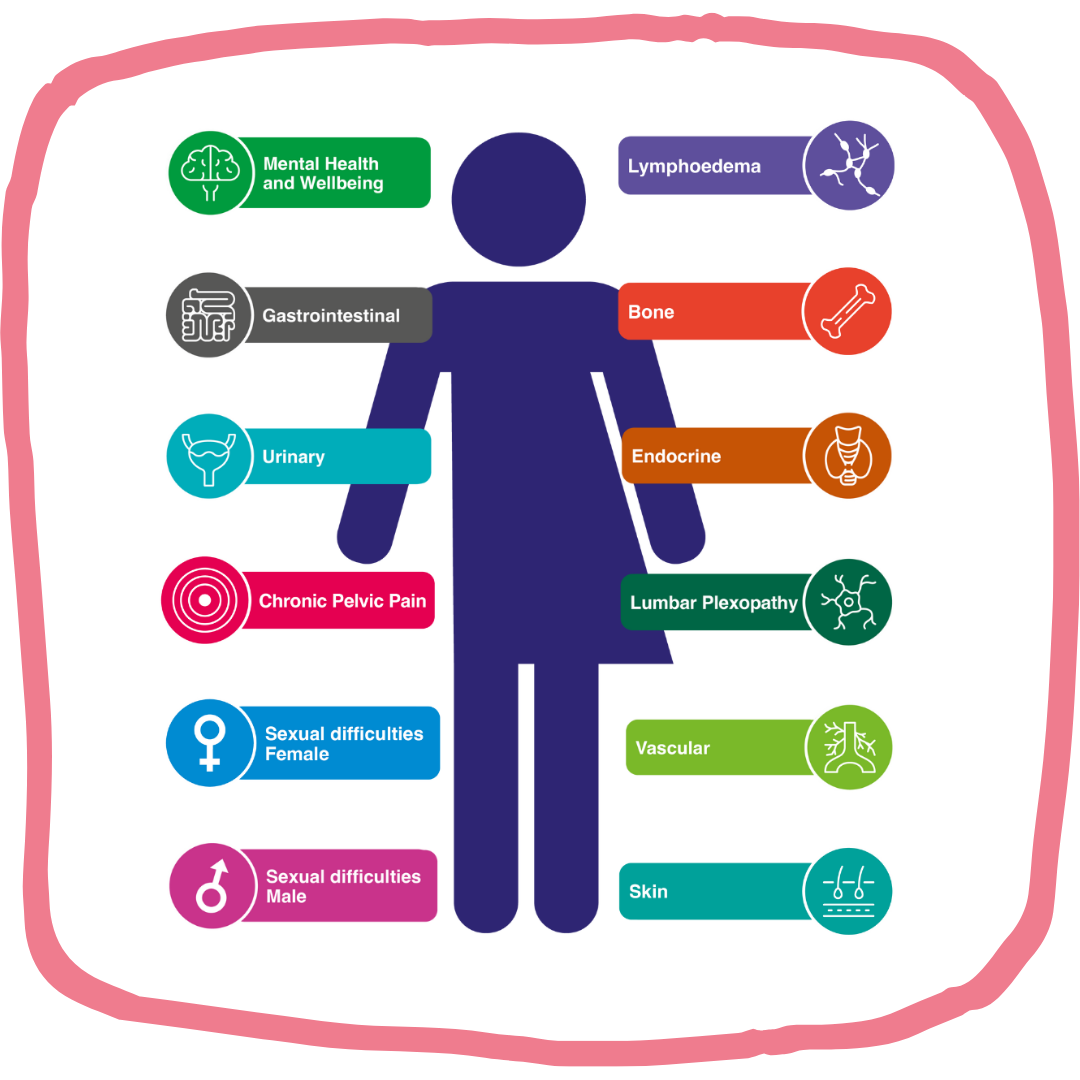 Life After Cancer: The Dialogue of Care
Life After Cancer: The Dialogue of Care
I was diagnosed with stage three cervical cancer in 2019. My treatment—radiotherapy, brachytherapy, surgery, and chemotherapy—was manageable, but my cancer pathway felt like one story told twice: the story I heard at diagnosis versus the reality afterward. I don’t blame the doctors, but I struggle with how side effects are discussed—and how the system delivers care in fragmented pieces rather than as a connected whole. From my point of view, it felt like being handed a jigsaw puzzle without the picture on the box.
The Physical Aftermath
Cancer leaves marks you can see—and marks you can’t. I live with lymphoedema, a constant reminder of the trauma my body endured. Surgery removed the tumour and lymph nodes, but it also reshaped my anatomy. My radical hysterectomy, while life-saving, changed parts of me I will never get back. I’m learning to live with that—but it’s not easy. Dilators and talking therapy help—but they don’t capture what it feels like to inhabit a fundamentally altered body. I’ve been told to relax certain muscles, and that this will help. I found it slightly ironic—being told to “just relax” after someone has rearranged my insides feels… ambitious. Relaxing helps—but only partially. Surgery is brutal, and I’ve had to mourn parts of my life, which sits at odds with the narrative that dilators and relaxation will fix everything. The physical, emotional, and intimate consequences deserve more honesty, support, and resources—and reading other people’s accounts shows I’m not alone. I can’t help but notice that women are often expected to accept this kind of loss quietly. Fertility barely registered on my radar when cancer loomed. Radiotherapy was meant to minimise risk to ovaries—but though I knew this wouldn’t fully protect them, it offered a tiny thread of hope. Surgery seemed promising too—fewer chemotherapy sessions—but no one explained how much it would affect my life long-term, arguably more than chemo. Treatments could have been planned to reduce long-term impact while maximising efficiency—but these considerations weren’t discussed or joined up. Everything felt rushed and fragmented. Conversations had to be made quickly, yes—but too often, the focus was on hope rather than consequences. Lymphoedema was downplayed. I was told it probably wouldn’t affect me. Later, practical advice—about long flights, hair removal, daily care—arrived in pieces and sometimes conflicted. It wasn’t the fault of any clinician, but it shows how systems can struggle to provide consistent guidance. Fatigue is now a constant companion. Menopause arrived suddenly, making everything harder—but the way it was discussed felt more hopeful than realistic. Oncologists focus on treating cancer rather than every side effect, yet it wasn’t necessary to say my menopause treatment would be “individualised” and then simply prescribe Tibolone. It felt like a pleasant narrative rather than a considered plan—and Tibolone and my body were not a match made in heaven.
Family, History, and Uncertainty
Recovery isn’t just medical—it’s emotional and personal. I never knew my father, and my mother’s memory gaps make it hard to piece together a complete family history. Questions about heart health, hormones, and genetic risk remain partly unanswered. My GP suggested genetic testing, though the referral came much later. I understand that genetic testing isn’t feasible for everyone—but the uncertainty of having cancer while coming from a fractured family complicates recovery. Awareness of adverse childhood experiences (ACE) could also help. ACEs amplify vulnerability to stress, illness, and even cancer. After treatment, I tried to find my absent father and learned he had died. That loss layered itself on top of everything else. Not cancer-related, but it shook me—and I suspect others from challenging backgrounds would benefit if this were considered in care pathways.
Coping, Support, and Resilience
I’m lucky to have support: a partner and chosen family who provide emotional and practical help. But even with support, recovery can feel impossible at times. It’s less about returning to who I was and more about learning to live differently in the body I have now—which is a tough thing to grasp. Cancer amplified old wounds and created new ones—both expected and unexpected. My blood pressure and cholesterol have risen despite a healthy lifestyle, and I suspect the compounded stress of treatment and family complexity plays a part. Trauma and stress carry measurable risks, and I feel them every day. Had there been a plan from the start—one that considered both the cancer and my personal history—some of this might have been easier to manage. I might have prepared better for lymphoedema or made more informed decisions about chemotherapy versus surgery. The subtle impact is what surprises you most: it’s not just the obvious side effects, but how your life quietly shifts around them—your energy, priorities, and sense of self. Sometimes it feels like being slowly rearranged by a committee you’re not part of.
Moving Forward
Life after cancer is never a return to the way things were. It’s a negotiation between what medicine can do and what you can live with. The dialogue of care—the story told twice—needs to evolve to reflect not only what the system can provide but what patients truly need. For me, and anyone whose history complicates recovery, this means early, consistent, trauma-informed communication; specifically, transparent information so patients can make informed decisions. Consent isn’t about knowing everything—it’s about accessing the relevant information and understanding how different treatments fit together: how each choice may affect long-term impact and life afterward. Ideally, follow-up care would see oncology, late-effects, sexual health, and mental health teams working together—but I know the NHS is under real pressure, and this isn’t always possible. I accept that recovery is ongoing. Some days are harder than others. But with honesty, clear information, and practical support, it is possible to build a life that feels full and meaningful—learning to listen to your body, adjust your expectations, and care for yourself. It’s not about going back; it’s about moving forward with eyes open, with help when you can get it—and accepting that, all too often, the system’s version of “help” comes with small print you weren’t given.
Useful links
- Pelvic Radiation Disease Best Practice Pathway – Designed for healthcare professionals caring for those with PRD, it is also a valuable resource for people living with PRD, seeking to understand their care options and advocate for better support. The PRD Best Practice Pathway covers information on the symptom areas that can be impacted by PRD.

- Support – Connect with other people living with PRD:
- our friendly Online Community is a safe and supportive space for people living with Pelvic Radiation Disease (PRD) to share their experiences, ask questions, and learn from others.
- our Chat Together support group can help people living with PRD by providing a sense of connection, understanding, and shared experience. Talking to others who have faced similar challenges offers emotional support, practical advice, and reassurance that you’re not alone.

- Specialist support available from other organisations
- NAPAC (the National Association for People Abused in Childhood) offers support to adult survivors of all types of childhood abuse, including physical, sexual, emotional abuse or neglect.
- Maggie’s are able to offer support to help manage worries, anxiety, and distress that you may experience following a cancer diagnosis and treatment. You can contact Maggie’s on 0300 123 1801 or via their email: enquires@maggies.org. Alternatively, there are 24 physical Maggie’s centres throughout the UK- no appointment is needed. You can simply pop in and meet with one of the team.
- Macmillan provides physical, emotional and financial support to help you live life as fully as you can.
- Samaritans provide 24/7 emotional support, from with trained volunteers who listen without judgment, to people in distress.
- Shout – available for anyone struggling with their mental health.
